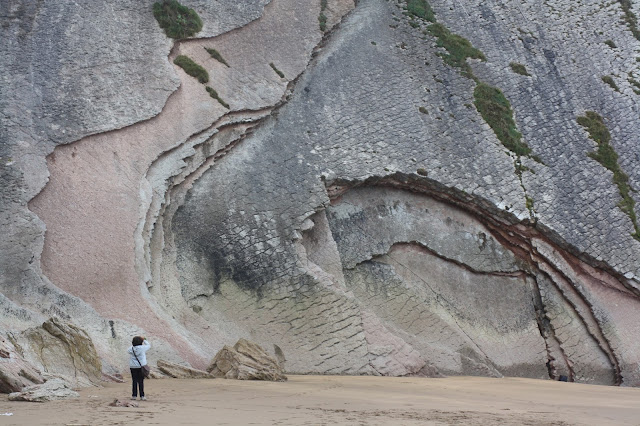Posted to planet Zog while parked-up in the car of a recently abandoned factory in the less salubrious hinterland of Zumaia:
"We are just about to drive to the docks in Bilbao where we will catch the ferry back to Portsmouth. It's been a great trip. Since we bought the motorhome in June 2013 I reckon we have spent about 600 days travelling around Europe. You might think that eventually you might cease to be surprised by places. Always though you find unexpected delights. We stopped at Zumaia last night. The guidebook described it as a small industrial town and port. It failed to mention it has some of the most astonishing rock formations we have ever seen."
Gill was very excited, among the slate and shale beds, upended, almost vertical, there were layers of crustaceous limestone. "We get oolitic and carboniferous back home, but rarely crustaceous." I realised by her tone that this was a big time geological moment. So, I did not really get the chronology or the science, but even as a purely visual experience I could see that the cove was unique. This evening's homework... acquire an imperfect understanding of the Cretaceous. What would we do without Wikipedia?
Cretaceous, an epic epoch! TRex rules the land alongside bumblebees, super-sized sharks inhabit the warm shallow seas. Most of the earth's petroleum deposits were laid down at this time; a mixture of the strange and the familiar - dinosaurs and fig trees. Next time I eat a fig I am going to think, triceratops may have munched these.
Cretaceous, an epic epoch! TRex rules the land alongside bumblebees, super-sized sharks inhabit the warm shallow seas. Most of the earth's petroleum deposits were laid down at this time; a mixture of the strange and the familiar - dinosaurs and fig trees. Next time I eat a fig I am going to think, triceratops may have munched these.
 |
| Being reminded of how puny we are can be oddly liberating - the girl's reaction was spot-on. |
There is something humbling about being confronted by ancient rocks, especially those associated with the Cretaceous period which ended with the mass extinction of 75% of species due to the impact of an asteroid measuring over 10kms near the Yucatán peninsula.
There is persuasive evidence that we are entering another period of mass extinction prompted by man-made emissions. Here today, gone tomorrow, I am unconvinced that we will destroy life on the planet, but we may be render it uninhabitable for us. Next time you eat a fig or open a jar of honey perhaps you might reflect that figs and bumblebees, who outfoxed the last extinction event, may be better equipped in evolutionary terms than us to survive the next one.











No comments:
Post a Comment